 |
 |
 |
 |
|
JANUARY 1944
1 January: Rommel became commander-in-chief of the German troops in North France. 4 January: Hitler refused to withdraw the German eastern front. 5 January: Globocnik submitted (from Trieste / Italy) to Himmler a report on the economic results of "Aktion Reinhard". 6 January: Soviet troops advanced into Poland. 11 January: To suppress the Norwegian opposition 400 students were deported to German KZs. 22 January: Allied troops landed in Anzio (south of Rome). 24 January: Roosevelt created the "War Refugee Board" for Jews under Nazi ocuupation. 28 January: The German siege on Leningrad ended after 900 days. 29 January: U.S. forces attacked the Japanese-occupied Marshall Islands. 31 January: U.S. troops took the Marshall Islands. |
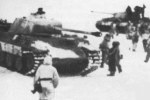 |
|
FEBRUARY 1944
1 February: General de Gaulle combined the French resistance movements. 12 February: The battle of Monte Cassino (Italy) started. 17 February: U.S. air raid on Truk, the major Japanese stronghold for its Fleet. 20 February: The Allied air offensive ("Big Week") against German industrial plants started. 22 February: Churchill accepted the Soviet-demanded shifting of the Polish borders towards the west. |
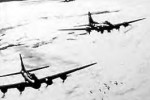 |
|
MARCH 1944
4 March: The Soviet Spring Offensive started. As a consequence the German Wehrmacht retreated from the Ukraine. 4 March: First major Allied daylight bombing raid on Berlin. 6 March: Armistice negotiations between Finland and the USSR. 15 March: As chief of the "Department for Jewish Affairs" Eichmann ordered the systematic registration of all Greek Jews. 16 March: Armistice negotiations between Rumania and the Allies. 19 March: Wehrmacht and SS occupied Hungary. As a result all Hungarian Jews fell into Nazi hands. 22 March: U.S. Marines entered New Guinea. Japanese troops crossed from Burma into India. 24 March: Roosevelt issued a statement condemning German and Japanese ongoing "crimes against humanity." 29 March: In Moscow the "National Committee 'Free Germany'" asked for the fight against the Nazis regime. 29 March: The Red Army liberated Kolomyja. 31 March: All parents in endangered areas of Germany were asked to send their children to save regions ("Kinderlandverschickung" / KLV). |
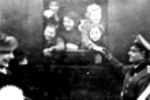 |
|
APRIL 1944
1 April: In Hungary the Germans enacted racial laws against the Jews. 2 April: The Red Army occupied Rumania. 7 April: The Red Army started to reconquer the the Crimea. 7 April: Two Jews escaped from Auschwitz-Birkenau. One of them, Rudolf Vrba, submitted a report to the Vatican. 14 April: 5,200 Jews from Athens were deported to Auschwitz. 19 April: Last German air raid on London. 28 April: The first deportation transport of Hungarian Jews arrived at Auschwitz-Birkenau. Auschwitz: In spring 1944 the new ramp at Birkenau was built. |
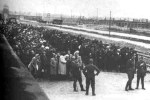 |
|
MAY 1944
5 May: Death penalty in Germany for "each endangering of Germany's warfare and security of the Reich". 12 May: German troops surrendered in the Crimea. 14 May: Parts of the German military leadership in France planned a putsch against Hitler (together with Generalfeldmarschall Rommel). 15 May: Beginning of deportation of Jews from Hungary to Auschwitz. 26 May: Wirth was killed in street fighting by Yugoslav partisans. Himmler's secret agents proposed to the Allies to trade Jews for trucks, other commodities, or money. |
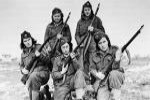 |
|
JUNE 1944
4 June: The Allies conquered Rome. 6 June: "The Invasion" ("D Day"): Allied troops (6,000 ships, and 150,000 soldiers, supported by heavy warship bombardment and 14,000 bombers) landed in the Normandy (France). 10 June: SS troops liquidated the town of Oradour-sur-Glane in France. 12 June: Rosenberg ordered the "Hay Action", the kidnapping of 40,000 10-14 years old Polish children for slave labor in the Reich. 13 June: First V1 rocket attack on London. 15 June: U.S. bombers attacked the mainland of Japan from China. 19-20 June: Battle of Philippine Sea (Pacific). 22 June: Stutthof: First known gassing at KZ Stutthof. 23 June: A Danish, German, and International Red Cross delegation visited Terezin (Theresienstadt). Chelmno: Start of the "Second Phase", which ended in July. A further 10,000 Jews from the Lodz Ghetto were murdered. |
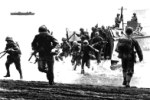 |
|
JULY 1944
3 July: The Red Army liberated Minsk. 4 July: Soviet troops arrived at Maly Trostinec. 5 July: The British Foreign Minister Eden informed the parliament about the deportation and extermination of European Jews. 13 July: The Red Army entered Vilnius. 20 July: The most famous attempt on Hitler's life failed, carried out by the Wehrmacht officer Claus Graf Schenk von Stauffenberg at Hitler's headquarters "Wolfsschanze" in Eastern Prussia. 22 July: The Lipowa Street camp in Lublin was liquidated. The remaining 229 inmates were sent to Auschwitz. 22 July: The Red Army liberated Lublin. 23 July: KZ Majdanek was liberated by the Red Army. 26 July: The Red Army liberated Lviv (Lwow). 27 July: The Red Army liberated Przemysl. The KZ Majdanek was evacuated because of the pushing ahead of the Red Army. Treblinka: The work camp ("Treblinka I") was wound up in late July. In July and August 1944 transports of prisoners left Plaszow for Auschwitz, Stutthof, Flossenbürg, Mauthausen, and other KZs in Germany. The Swedish diplomat Wallenberg arrived in Budapest and proceeded to save nearly 33,000 Jews by issuing diplomatic papers and establishing "safe houses". |
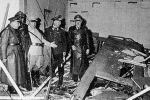 |
|
AUGUST 1944
1 August: Beginning of the Polish underground uprising in Warsaw. 4 August: Anne Frank's family was arrested. 6 August: Liquidation of the Lodz Ghetto. 60,000 Jews were sent to Auschwitz. 16 August: Treblinka: The site of the former camp was occupied by the Red Army. 18 August: Ernst Thälmann, chief of the German Communist Party (KPD), was killed at KZ Buchenwald, after 11 years of imprisonment. 19 August: Resistance uprising in Paris. 21 August: Foundation of the United Nations Organization by the U.S., China, Great Britain, and France. 25 August: Allied and French troops liberated Paris. 31 August: The Red Army liberated Bucharest. |
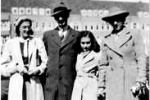 |
|
SEPTEMBER 1944
2 September: Artificial flooding of parts of the Netherlands and Belgium, caused by German troops to impede the Allied advance. 3 September: The final train, destined for Auschwitz, left Holland, containing 1,019 Jews. 4 September: Allied troops took Antwerp (Belgium). 8 September: First V2 Rocket attack on London. 8 September: Bulgaria surrendered to the Soviet Union. 11 September: Allied troops enter Germany near Trier. 11 September: Churchill and Roosevelt agreed on the "Morgenthau Plan" which intended Germany to become an agricultural state. 12 September: In London the U.S., Great Britain, and the USSR published their plan to divide Germany into occupying zones. 12 September: Nonaggression treaty between Rumania and the Allies. 17 September: Biggest WW2 airborne assault ("Operation Market Garden"): 35,000 Allied troops were dropped in the Netherlands behind the German lines. 19 September: Nonaggression treaty between Finland and the USSR. 23 September: 200 members of the Auschwitz "Sonderkommando" were gassed with Zyklon B in the delousing barrack at the Main Economic Area near the "Stammlager", called "Kanada I". 25 September: Hitler ordered the registration of all men between 16 and 60 for the "Volkssturm", the last reserves. 26 September: Soviet troops occupied Estonia. 28 September: Start of the deporation of 18,000 Jews from Terezin to Auschwitz-Birkenau. Chelmno: The primitive crematoria in the "Waldlager" were dismantled. Amon Göth (Plaszow camp commander) was arrested by the SS. |
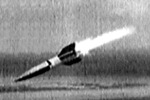 |
|
OCTOBER 1944
2 October: The Warsaw Uprising ended as the Polish Home Army surrendered to the Germans. 3 October: Hitler ordered the retreat of German troops from Greece. 5-6 October: The Red Army occupied Hungary. 7 October: Auschwitz: The Jewish "Sonderkommando" at the crematoria IV revolted and set it on fire. 14 October: Allies liberated Athens. Generalfeldmarschall Rommel committed suicide. 15 October: Nonaggression treaty between Hungary and The USSR. As a result the German Wehrmacht occupied Budapest. 16 October: The Red Army entered East Prussia. 18 October: First "Volkssturm" units in Germany. 20 October: Belgrade captured by Soviet and Yugoslavian partisan units. 20 October: The U.S. Fleet entered the Leyte Gulf and landed invasion troops on the Philippines. 21 October: Allied troops took the first large German town, Aachen. 23-26 October: Battle of the Leyte Gulf (biggest naval battle in history). 28 October: Nonaggression treaty between Bulgaria and the Allies. 28 October: 2,000 Jews from Terezin (Theresienstadt), arrived at Auschwitz. |
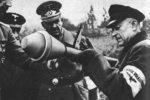 |
|
NOVEMBER 1944
probably 2 November: Last use of gas chambers at Auschwitz. 8 November: The SS forced 25,000 Jews to walk over 160 km (100 miles) from Budapest to the Austrian border. 10 November: In Köln 13 members of the youth resistance group "Edelweißpiraten" ("Edelweiss Pirates") were executed. 12 November: The last German battleship "Tirpitz" was sunk in a Norwegian Fjord. 17 November: Female members of the German "Arbeitsdienst" were called for duty at antiaircraft guns. 20 November: Hitler left his East Prussian headquarters "Wolfsschanze" and moved to his new headquarters at the bunker below the "Reichskanzlei" in Berlin. 23 November: U.S. troops reached the Rhine. 24 November: French troops captured Strasbourg. Auschwitz: Bunker II (the second primitive gas chambers building at Birkenau) remained unused until the summer of 1944. Then it was used again as a gassing facility for Hungarian Jews. During this "Hungarian Action" the building was called "Bunker 5". It was demolished in November 1944. Gassing operations at Stutthof ceased in early November 1944. It has been estimated that at least 65,000 inmates died in the camp during its existence. |
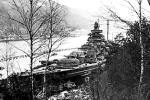 |
|
DECEMBER 1944
4 December: Civil War in Greece. Athens was placed under martial law. 16-27 December: Battle of the Bulge in the Ardennes (France), the last attempt of the German Wehrmacht to beat off the Allied troops. 27 December: Soviet troops besieged Budapest. Chelmno: All installations were destroyed in mid-December. Closure of the T4 centre Hartheim. |
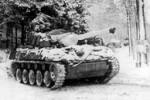 |
© ARC 2006